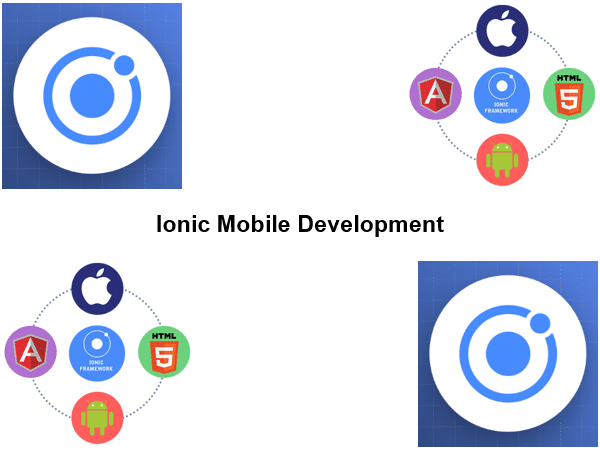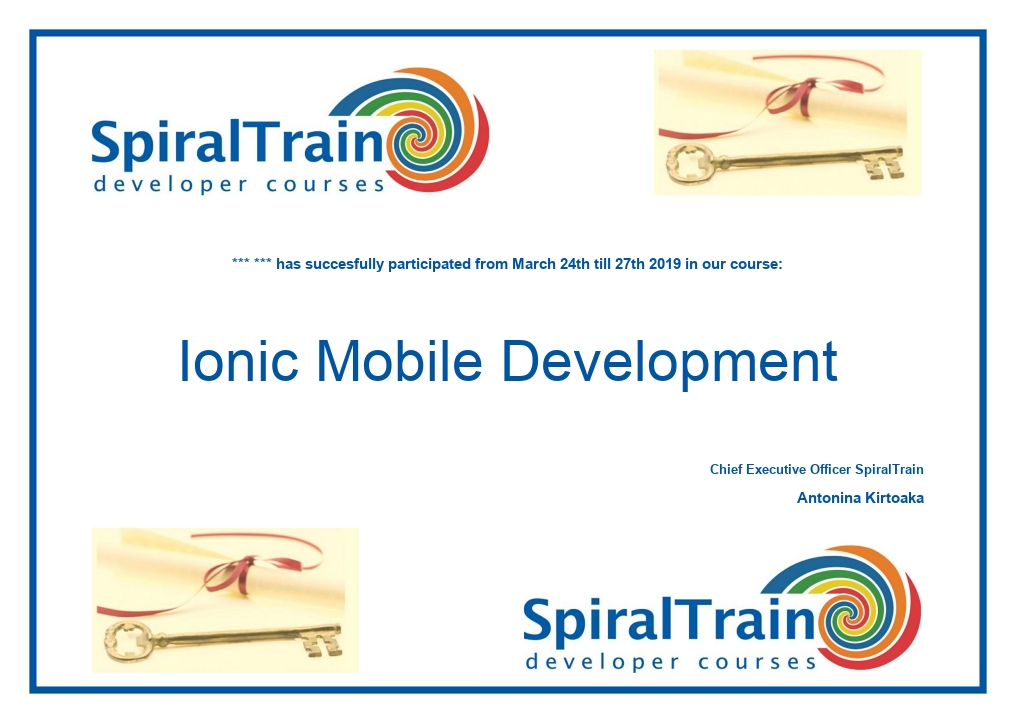-
Learning by doing
-
Trainers with practical experience
-
Classroom training
-
Detailed course material
-
Clear content description
-
Tailormade content possible
-
Training that proceeds
-
Small groups
In the course Ionic Mobile Development from SpiralTrain participants learn to develop cross platform mobile applications with the Ionic Framework. The Ionic Framework is an open source UI toolkit for building high performance mobile and desktop apps with good performance. In Ionic you use web technologies such as HTML, CSS and JavaScript and you can integrate popular JavaScript frameworks such as Angular, React and Vue.
The Ionic Mobile Development course starts with an overview of the architecture of Ionic. Attention is also paid to the Ionic CLI and the AppWizard with which Ionic Apps are generated via the command line or visually.
Subsequently Ionic Application templates such as a Blank, Tab or SideMenu template are treated. The templates form the starting point for an Ionic App and define its basic structure. Android and iOS-specific matters are also discussed.
Attention is paid to the many standard UI components available in Ionic such as buttons, list boxes, menus and many others. Also languages, frameworks and tools that can be used in the development of an Ionic App are part of the subject matter.
Furthermore the integration of Custom Web Components and HTML Templates in Ionic are in the course program. The Component Life Cycle, Ionic Stencil library and Ionic Core are treated as well.
The various forms of state in Ionic are discussed, such as global state, shared state and internal state. And also attention is paid to state management with a central store using actions and reducers.
Then it is time to discuss Database Access with the Firebase database and finally attention is paid to a number of advanced topics in Ionic such as Ionic Storage and Push Notifications.
and Push Notifications.
The course Ionic Mobile Development is intended for web and mobile developers who want to learn how to use the Ionic Framework for the development of cross platform mobile applications.
Experience with web application development and a good knowledge of JavaScript are required to participate in the course Ionic Mobile Development.
The theory in this hands-on course is treated by means of presentations. Illustrative demos are used to clarify the concepts discussed. The theory is interchanged with exercises. Course times are from 9.30 up and to 16.30.
After successful completion of the course the participants receive an official certificate Ionic Mobile Development.

Module 1 : Ionic Intro |
Module 2 : Application Templates |
Module 3 : UI Components |
|
Ionic Framework Hybrid Mobile Apps React, Angular or Vue Ionic Versions Apache Cordova Ionic CLI Installing Ionic Ionic AppFlow SDK Ionic start Template Project Adjust Angular Routes |
Blank App Tab App SideMenu App App Skeleton Folder Structure Ionic and Android Android SDK Genymotion Emulator Ionic and Ios Xcode and Tools Ionic Dashboard |
Action Sheets Buttons and Cards Checkbox and Chips Floating Action Buttons Date and Time Pickers Lists and Grids Items and Inputs Menu and Navigation Progress Indicators Toasts and Toggles Routing and Toolbars |
Module 4 : Languages and Tools |
Module 5 : Web Components |
Module 6 : State Management |
|
TypeScript Language Data Types Interfaces and Classes Decorators Angular Framework Angular Modules Template Syntax Dependency Injection RxJS Observables Observers and Subjects Sass CSS Sass Variables and Mixins |
Custom Elements Shadow DOM HTML Imports HTML Template Browser Compatibility Ionic Stencil Library Stencil Slots @Prop and @State Events Component Life Cycle Tag Selectors Use Ionic Core |
State in Webapps Single Page Apps Global State Shared State Internal State NgRx Intro Immutable Store Actions Reducers Selectors Pagination Component Updates |
Module 7 : Connecting to Firebase |
Module 8 : Advanced Topics |
|
|
Firebase Realtime Database Cloud Firestore Database Structure Firebase JavaScript SDK Firebase Web SDK Firebase Console Reading and Writing Data Query and Navigating Data Firebase Authentication $firebaseAuth collection-repeat Saving Form Data |
Platform Class Accessing Platform Theming Look and Feel $color Map Overriding Configuration Ionic Storage Push Notifications FCM REST Api Native Plugin React Integration Deploy to Devices |
